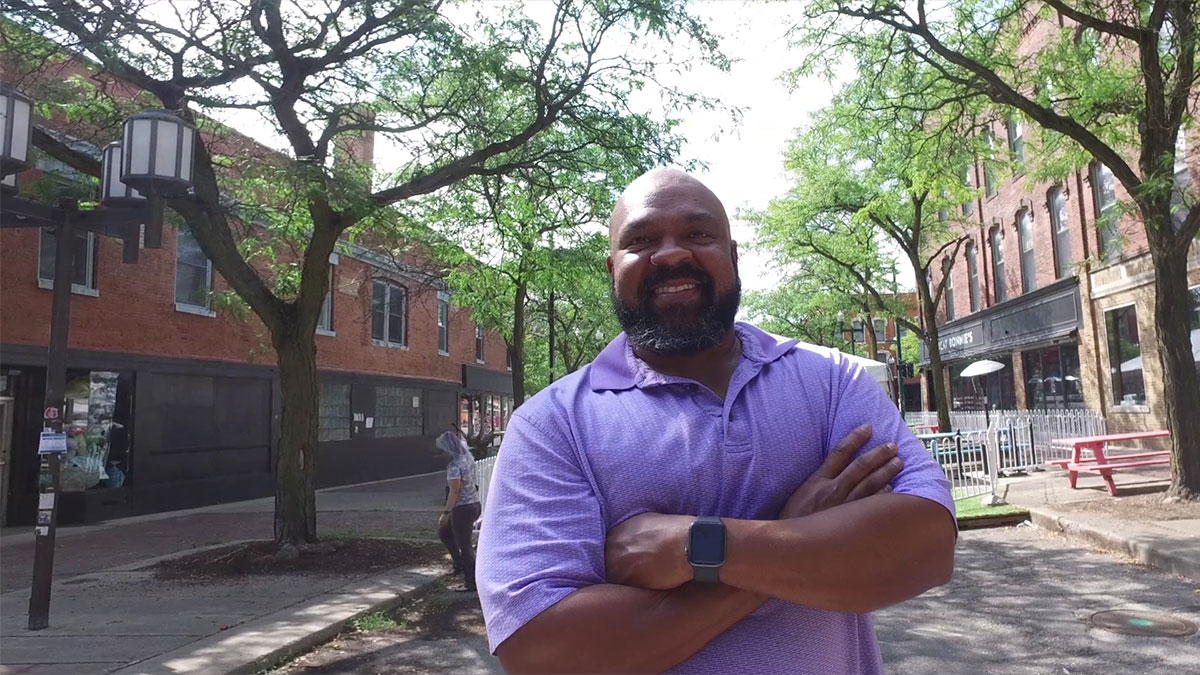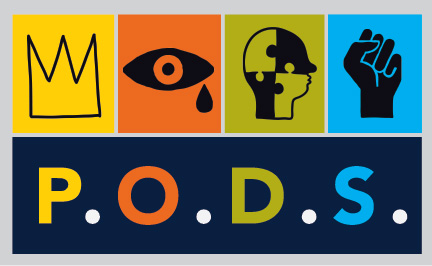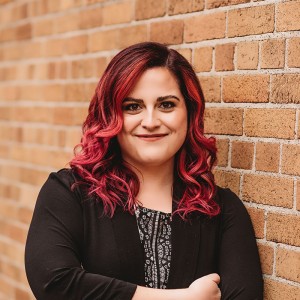
Anthany Beasley, MSW '15 shares about his practice working with LGBTQIA+ folks in Ypsilanti, Michigan
Watch the video.
Interpersonal Practice in Integrated Health, Mental Health, & Substance Abuse
The Interpersonal Practice in Integrated Health, Mental Health, and Substance Abuse Pathway focuses on total health and the connection between physical, mental and behavioral health. Integrated health care creates a comprehensive approach toward caring for people in need, resulting in both higher quality care and improved outcomes for each individual. Our pathway also encourages interprofessional education (IPE) opportunities and collaborations to prepare social workers to work as effective integrated health team members. This pathway prepares students to be practice-ready for interpersonal social work with individuals, families and groups in a broad range of health care settings.
Careers
Social workers in integrated health care work in clinics, agencies and health care systems, as well as on collaborative teams in health and behavior care sectors. The shift from segmented to integrated health care provides social workers the opportunity to not only contribute but also to lead health care teams. Social workers in integrated health care use their expertise to treat the whole person, rather than focusing on individual illnesses or behavioral health issues. Employment of mental health and substance abuse social workers is projected to grow 17 percent from 2019 to 2029, much faster than the average for all occupations.
Potential careers include:
- Case Manager
- Counselor (individual, couples and/or families)
- Victim Advocate (domestic violence, sexual assault)
- Forensic Social Worker
- Hospice Social Worker
- Medical Social Worker
- Mental HealthSocial Worker
- Probation Officer
- School Social Worker
- Behavioral Health Social Worker
- Substance Abuse Counselor
- Therapist
- Clinical Social Worker
- Wellness Coordinator/Coach
Field Experience
In the MSW program, some of the most important learning occurs outside of the classroom. Field placement is a supervised internship at an organization that provides the hands-on, real-world training portion of the curriculum.
Field placements might include:
- Hospitals and Health Systems
- Behavioral Health Centers
- Community Mental Health
- Mental Health Clinics
- Family Service Agencies
- Substance Use Treatment Programs
- Grief and Bereavement Programs/Hospice Organizations
- Outpatient Clinics
- Community Support Programs
- Higher Education
Program Details
Interpersonal Practice in Integrated Health, Mental Health, and Substance Abuse Pathway Course Requirements
Essentials
- SW505: Engaging Social Justice, Diversity, and Oppression in Social Work, 3 credits
- SW506: Essentials of Interpersonal Practice, 4 credits
- SW507: Research Basics for Social Work Practice, 1 credits
- SW508: Essentials of Social Welfare Policy, 3 credits
- SW509: Essentials of Community and Organizational Practice, 3 credits
- SW590: Introduction to Social Work Practice, 1 credits
- SW649: Practicing Policy with Current Events, 1 credits
- SW678: Program Evaluation and Applied Research, 3 credits
- SW699: Social Work Capstone, 1 credits
Pathway Requirement
- SW600: Behavioral, Psychosocial and Ecological Aspects of Health, Mental Health and Disease, 3 credits
- SW601: Applied Assessment Skills in Integrated Health, Mental Health and Substance Abuse, 3 credits
Pathway Requirement (choose one)
- SW602: Interpersonal Practice Interventions in Integrated Health, Mental Health, and Substance Abuse (Adults), 3 credits
- SW603: Interpersonal Practice Interventions in Integrated Health, Mental Health, and Substance Abuse (Children, Youth, Transitional Youth, and Families), 3 credits
Pathway Requirement (choose one)
- SW604: Advanced Evidence-Informed Interpersonal Practice with Families, 3 credits
- SW605: Advanced Evidence-Informed Interpersonal Practice with Groups, 3 credits
Please see course planning worksheets for a full list of courses associated with this pathway.
Competencies for Interpersonal Practice in Integrated Health, Mental Health, and Substance Abuse
University of Michigan's School of Social Work (U-M SSW) is accredited by the Commission on Accreditation (COA), of the Council on Social Work Education (CSWE). Accreditation is a system of recognizing educational programs as having a level of performance and quality that gain them the confidence of the educational community and the public. You can read more about the Educational Policy and Accreditation Standards here.
At U-M SSW, each pathway has specialized competencies that describe the knowledge, values, skills, and cognitive and affective processes that comprise the competency in each pathway area.
1. Demonstrate Ethical and Professional Behavior
Social workers demonstrate the ability to apply ethical social work principles and critical thinking to products and work produced. Social workers understand the role of emotional intelligence and professional resilience in professional and ethical practice. Social workers understand the role of other professionals when engaged in interprofessional teams within their areas of specialization. Social workers recognize the importance of life-long learning and ways that supervision and consultation can support continued development.
Practice Behaviors:
- Utilize supervision and consultation to guide professional decision-making.
- Demonstrate emotional intelligence in practice and professional situations.
- Utilize effective communication strategies appropriate to context.
2. Engage Diversity and Difference in Practice
Social workers understand how diversity and difference characterize and shape the human experience and are critical to the formation of identity. The dimensions of diversity are understood as the intersectionality of multiple factors including but not limited to age, class, color, culture, disability and ability, ethnicity, gender, gender identity and expression, immigration status, marital status, political ideology, race, religion/spirituality, sex, sexual orientation, and tribal sovereign status. Social workers understand that, as a consequence of difference, a person’s life experiences may include oppression, poverty, marginalization, and alienation as well as privilege, power, and acclaim. Social workers also understand the forms and mechanisms of oppression and discrimination and recognize the extent to which a culture’s structures and values, including social, economic, political, and cultural exclusions, may oppress, marginalize, alienate, or create privilege and power.
Practice Behaviors:
- Identify biological, socioeconomic, cultural, and behavioral risk and protective factors for health, disease, and quality of life across the life span in the context of the social determinants of health.
- Describe socioeconomic, cultural, and religious differences in health beliefs and practices, utilization of health services, and access and barriers to care.
- Describe stress, strain, chronic illness impact health, coping, and adaptation as they relate to health and disease across the life span in the context of diversity and social determinants of health
3. Advance Human Rights and Social, Economic, and Environmental Justice
Social workers apply their understanding of social, economic and environmental justice to advocate for the human right to have equal opportunity for optimal health and access to quality health care.
Practice Behaviors:
- Ability to identify and work to remove structural, political, social, economic barriers to the just and equitable delivery of health care locally, nationally and globally
- Initiate and engage in advocacy and health delivery practices that advance equity in health care access and delivery
4. Engage in Practice-informed Research and Research-informed Practice
Social workers understand quantitative and qualitative research methods and their respective roles in advancing a science of social work and in evaluating their practice. Social workers know the principles of logic, scientific inquiry, and culturally informed and ethical approaches to building knowledge.
Practice Behaviors:
- Understand that evidence informs practice and will be able to identify and provide evidence-based interventions and best social work practice in a variety of health settings including integrated health, mental health, behavioral health, hospital, outpatient and community care settings.
- Provide clinical, evidence-based/evidence-informed rationale for use of a specific intervention to match client needs, preferences and responses.
- Monitor and evaluate outcomes of interventions and modify, adjust interventions accordingly.
5. Engage in Policy Practice
Social workers understand how to analyze, formulate, and advocate for policies that advance human rights and social, economic, and/or environmental justice through the application of critical thinking skills. Social workers are able to identify how current events are linked to policy issues, how to critically analyze and understand policy implications, and apply strategies to engage in policy practice that effect change and advocate for clients.
Practice Behaviors:
- Identify how current events are linked to policy issues impacting clients and client systems.
- Analyze the implications of policy across service systems.
- Identify strategies to engage with policy to advocate for clients and client systems.
6. Engage with Individuals, Families, Groups, Organizations, and Communities
Social workers understand that engagement is an ongoing component of the dynamic and interactive process of social work practice with, and on behalf of, diverse individuals, families, groups, organizations, and communities. Social workers value the importance of human relationships. Social workers understand theories of human behavior and the social environment, and critically evaluate and apply this knowledge to facilitate engagement with clients and constituencies, including individuals, families, groups, organizations, and communities. Social workers understand strategies to engage diverse clients and constituencies to advance practice effectiveness.
Practice Behaviors:
- Initiate with and engage with clients (individuals, families, groups, organizations, communities)regarding health concerns and needs using interpersonal skills including professional use of self in relationship building, creating safe spaces for interaction and therapeutic alliance
- Demonstrate engagement skills of empathy and reflective listening
- Demonstrate effective engagement and communication with interprofessional team members including initiating contacts, sharing concerns, perspectives, and recommendations to team care-plans
7. Assess Individuals, Families, Groups, Organizations, and Communities
Social workers understand that assessment is an ongoing component of the dynamic and interactive process of social work practice with and on behalf of diverse individuals, families, groups, organizations, and communities. Social workers understand the theories of human behavior and the social environment, and critically evaluate and apply this knowledge in the assessment of diverse clients and constituencies.
Practice Behaviors:
- Apply a holistic approach to health in conducting biopsychosocial spiritual assessments including person in environment (PIE), strengths-based client assets, nature of the client, family and social support system, cultural, spiritual and religious beliefs and other socio-economic resources that impact on health and delivery of care
- Conduct brief, evidence-based, and developmentally sensitive screening for cognitive impairment, risky, harmful, or dependent use of substances, including alcohol, illicit drugs, and prescription medications and for risk related to self-harm, harm to others, impairments in functional self care and environmental safety.
- Identify signs of abuse, neglect, domestic violence and other traumas in individuals across the lifespan and conduct brief, evidence-based screening.
8. Intervene with Individuals, Families, Groups, Organizations, and Communities
Social workers understand that intervention is an ongoing component of the dynamic and interactive process of social work practice with, and on behalf of, diverse individuals, families, groups, organizations, and communities. Social workers are knowledgeable about evidence-informed interventions to achieve the goals of clients and constituencies, including individuals, families, groups, organizations, and communities. Social workers understand theories of human behavior and the social environment, and critically evaluate and apply this knowledge to effectively intervene with clients and constituencies. Social workers understand methods of identifying, analyzing and implementing evidence-informed interventions to achieve client and constituency goals. Social workers value the importance of interprofessional teamwork and communication in interventions, recognizing that beneficial outcomes may require interdisciplinary, interprofessional, and inter-organizational collaboration.
Practice Behaviors:
- Deliver brief, trauma-informed, evidence based interventions for mental conditions, risky or harmful substance use conditions, adjustment to illness and chronic disease management.
- Provide information, education, guidance, and support to clients and family members about health conditions, prevention, available treatments, illness and self-management, peer support and recovery.
- Use inter-professional collaboration as appropriate to achieve beneficial practice outcomes
9. Evaluate Practice with Individuals, Families, Groups, Organizations, and Communities
Social workers understand that evaluation is an ongoing component of the dynamic and interactive process of social work practice with, and on behalf of, diverse individuals, families, groups, organizations, and communities. Social workers recognize the importance of evaluating processes and outcomes to advance practice, policy, and service delivery effectiveness. Social workers understand theories of human behavior and the social environment, and critically evaluate and apply this knowledge in evaluating outcomes.
Practice Behaviors:
- Provide clinical, evidence-based/evidence-informed rationale for use of a specific intervention to match client needs, preferences and responses.
- Monitor and evaluate outcomes of interventions and modify, adjust interventions accordingly.
The graduate courses listed below have been taken by previous MSW students or have been identified as being of possible interest to students in this pathway and can be taken to fulfill Pathway Required Electives. On the course planning worksheet, information regarding Pathway Required Electives is included.
There are many other courses not listed below that may be of interest and may also meet the elective requirement. If you identify a pathway-related course not listed below that you want to take to meet your Pathway Required Electives (rather than simply an elective), please contact the Technical Advisors ([email protected]) for approval.
Interest in courses numbered below 500 should be checked for graduate-level status since many are offered for undergraduate credit only. You can check this by contacting the department offering the course or contacting the SSW registrar ([email protected]).
In addition, some courses may be restricted, require prerequisites, not be open to social work students, and/or require instructor permission. If you encounter problems registering for these courses, please contact the department offering the course. The SSW registrar will not be able to assist with registration in outside courses because these courses are not offered by the SSW.
The courses listed below are offered in various semesters. To see if a course is offered in the term you are interested please check the SSW list of outside courses, the website of the department offering the course, or the Wolverine Access Class Search page.
If you want to use one of these non-School of Social Work courses to fulfill the Interpersonal Practice in Health, Mental Health and Substance Abuse Required Electives (SWrIP), you will need to fill out a course substitution to receive approval. In the "Rationale for Substitution" box you should reference this page.
Anthropology - Cultural
- ANTHRCUL 558 - Current Issues in Sociocultural Anthropology
Learn More About Social Work
Pathway Faculty
Student Profiles
Student Profile
Jazz McGinnis
-
Field Placement:University of Michigan Hospital, HIV/AIDS Treatment Program
-
Scholarship:Integrated Health Scholarship
"People told me as a kid that I should be a therapist," says Jazz McGinnis. "I was good at listening and making connections between people. It was that seed that led me to pursue social work as a career." After earning a BA in Sociology from the University of Oregon, Jazz worked in many community health settings, including a federally qualified health center in Portland, OR. "I've always had a passion for serving individuals from marginalized populations," Jazz says. "The last clinic I worked at provided care to people who were experiencing homelessness and/or were unstably housed. A large proportion of these folks were LGBTQ and people of color." He recalls of his clinical work, "I was a part of a primary care team that included doctors, nurse practitioners, naturopaths, social workers, medical assistants, and lab staff that delivered the holistic health care that our patients deserved. I knew that, if I wanted to be a part of a team like that as a behavioral health provider, I needed to get a social work education that taught me to be medical social worker on an interdisciplinary health care team."
Jazz chose the U-M School of Social Work for its Integrated Health Program. "I wanted the best education so that I could go out and provide the best patient care possible to the people who need it most. I was also drawn to U-M's emphasis on social workers becoming leaders within their field and who can bring an understanding of social justice and ethics to their work." Soon Jazz was doing all of this, as a U-M School of Social Work Integrated Health Scholar.
How did the School and the program work out for Jazz? "I love being here," he says. "My fellow Integrated Health Scholars are passionate about bringing our social work knowledge and perspectives to all facets of our lives. There are ten of us going through the program together. We've come to know and trust each other and care about each other's lives. We want to be change agents and empower our clients to achieve their best health and wellness. I'm thrilled my field placement is at the HIV/AIDS Treatment Program at the U-M Hospital. The social work team there ensures that patients living with HIV/AIDS know we are invested in their well-being, including feeling connected to and heard by every team member. They know they can come to us for whatever they need to stay well."
The Integrated Health Scholarship was critical to Jazz's experiences. "I would never have been able to afford coming to U-M and developing myself into a social worker without this scholarship," he says.
Jazz has a particular passion for LGBTQ health care and especially for trans health care, as he knows the hardships and marginalization that queer and trans people face as a trans man himself. "We need to work on all fronts," he says, "including housing, employment, health care and mental health-so trans people can achieve their optimal quality of life."






